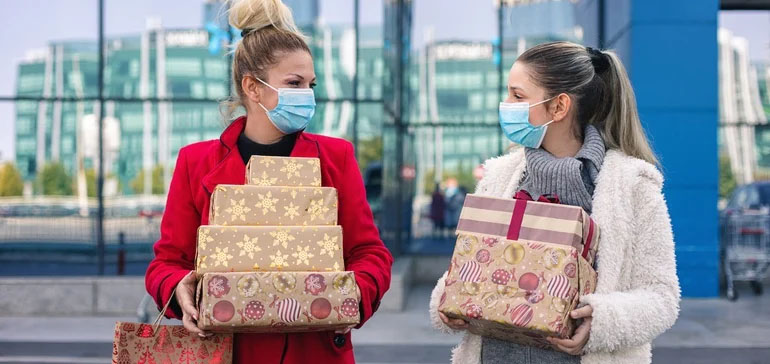kajakiki via Getty Images
Daphne Howland|Source: www.retaildive.com, September 2021
Dive Brief:
- Consumers are retrenching in the face of the delta variant of the coronavirus, with 20% “highly optimistic” about a return to normal, down from a third at the beginning of the summer, according to Numerator research. Nearly 60% are “very or somewhat concerned” about holiday plans being disrupted by the pandemic, Berkeley Research Group found.
- The number of people who said they had resumed pre-COVID behaviors fell for the first time, from 39% in July to 27% in August, Numerator said. Nearly half say they expect a full reopening to be delayed until 2022 or later, up from 23% who said so in July and 18% in June, the firm found.
- The comfort level of shopping without a mask dropped 15 percentage points from July to August, with 34% preferring to go in stores with mask requirements and 36% having a higher level of respect for businesses that enforce mask wearing, per Numerator research.
Dive Insight:
After waning this year, troublesome uncertainty is gaining strength, as the delta variant of the virus spreads and immunization rates in many areas falter.
Wells Fargo economists noted that new COVID-19 cases were averaging about 100,000 daily at the time of their August economic outlook report, but had risen to more than 150,000 per day at the time of their September report last week.
“As a result, Americans have generally become more cautious,” they noted.
To address the renewed strength of the disease and its risks to health, life and the economy, President Joe Biden last week announced an unprecedented move to require large businesses to vaccinate their employees or have any unvaccinated employees produce a negative test at least weekly.
In the meantime, many consumers are falling back into their cautious pandemic ways. That includes shopping online more: Nearly 60% will use a mix of online and in-person shopping for the holidays, but just 13% plan to shop entirely in physical stores, while 24% plan to shop entirely online, Berkeley Research Group found.
Pandemic-related declines in tourism and office work that affect retail are also surging again. Numerator found that comfort with traveling for leisure declined seven percentage points from July to August. And the number of employees telecommuting due to COVID-19 rose 400,000 in August, the first increase in work-from-home since late last year, according to the National Association of Real Estate Investment Trusts.
The backsliding is occuring as retailers prepare for the holiday season, which for many can make or break their year. Services like curbside pickup are likely to regain their importance, according to Forrester Principal Analyst Brendan Witcher, speaking by phone.
The delta strain’s impact is also being felt on the supply side, with several retailers reporting rising freight costs and inventory constraints. Retailers should be prepared not only to offer omnichannel services but also to sell a lot of gift cards.
“We don’t see these problems easing up before the holidays, so retailers will need to be creative in how they attract shoppers given the strain on popular items,” Darren Morrison, a managing director at Berkeley Research Group, said in a statement.
Follow Daphne Howland on Twitter

